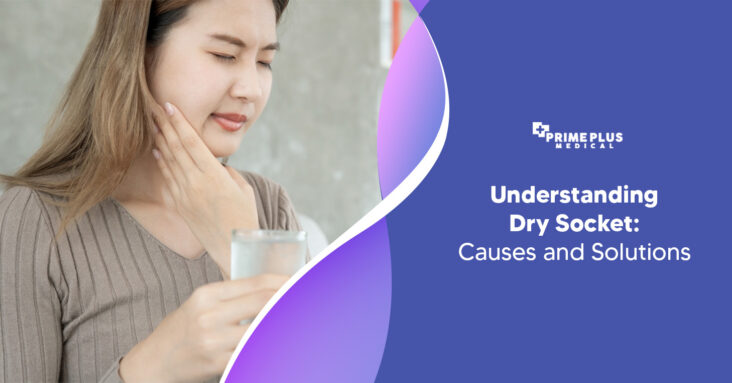Have you ever heard about dry sockets? If you have, the first thing that comes to mind when hearing this phrase is most likely pain. Excruciating pain, to be exact.
Dry socket, scientifically known as alveolar osteitis, is a painful dental condition that can occur after tooth extractions. While most tooth extractions result in normal healing, a dry socket is a potential complication that can delay recovery.
According to the National Health Service (UK), a dry socket is one of the most common complications of wisdom tooth extraction that happens when a blood clot fails to develop in the tooth socket or becomes dislodged. This condition tends to develop 3 to 5 days after the tooth extraction.
In this article, we will lead you through all the basics you need to know about dry sockets, helping you to understand the causes, symptoms, treatment, and most importantly, when to see a dentist for an emergency appointment.
What are the symptoms of dry socket?
As mentioned before, the most prominent symptom of a dry socket is intense pain that typically starts a few days after a tooth extraction. The pain may radiate to the ear and jaw and is often described as throbbing and continuous.
Pain caused by dry sockets is also often described as pain that does not respond to painkillers, such as non-steroidal anti-inflammatory drugs (NSAIDs) and paracetamol.
ther common symptoms include bad breath and an unpleasant (often bitter or sour) taste in the mouth. Furthermore, if you look into the socket, you might see exposed bone instead of a blood clot.

What are the causes of dry sockets?
A dry socket occurs when the blood clot that normally forms in the socket after a tooth extraction fails to develop or becomes dislodged before the wound has properly healed.
The blood clot plays a crucial role in the healing process by protecting the underlying bone and nerves. When the blood clot is missing, the exposed bone and nerve endings become susceptible to infection and severe pain.
According to the National Health Service (UK), the following factors can increase the risk of developing dry socket:
- not following the dentist’s instructions after the extraction
- smoking
- previously suffering from this condition
- being over 25 years old
- the extraction was complicated
Every dentist will instruct their patients to maintain excellent oral hygiene post-extraction to prevent infection and disruption of the formation and retention of blood clots.
Furthermore, it is also crucial to stick to liquid diets and soft foods and avoid hard foods, very hot or cold foods and drinks, and spicy foods, as instructed by your dentist. When in doubt, make sure to consult a healthcare professional.
read more article Effective Ways to Speed Up Recovery from the Common Cold
Treatment of Dry Socket
If you believe you might be suffering from a dry socket, seeking prompt dental attention is crucial for effective treatment.
Your dentist will examine the affected area and clean the socket by removing debris. Your dentist may also place a medicated dressing in the socket, which in some cases may be removed and replaced regularly until the socket heals.
Furthermore, your dentist will prescribe antibiotics to treat the infection and prevent further complications. You can continue taking your regular painkillers, such as ibuprofen or paracetamol, to manage the pain until the socket heals.
Healing Time
The healing time for dry sockets varies from person to person and depends on factors such as overall health, oral hygiene, and the severity of the condition. In general, most patients experience relief from symptoms within a week of initiating treatment or by the time they have completed their course of antibiotic treatment.
A dry socket may sound like a nightmare following an already painful dental procedure. However, by understanding the causes, you can do your best to prevent dry sockets. By recognizing the symptoms, you can make the right decision to see a dentist for an emergency appointment as soon as possible.
We sincerely hope you never suffer from dry sockets. However, if you ever need us for any emergency or regular dental appointments, our English-speaking team at Prime Plus Medical in Canggu is ready to assist you.

